
The Best of Everything
Encyclopedia Entry • Films Main
They All Kissed the Bride
1942

Critics' Reviews • Our Reviews • Movie Posters • Lobby Cards • Misc. Images
Click here to see photos from the film.
US theatrical release: 6/11/42.
VHS release: 2/11/97. DVD release: Spain Region 2 (unknown date)
Cast: Joan Crawford (as "Margaret Drew"), Melvyn Douglas, Roland Young, Billie Burke, Andrew Tombes, Allen Jenkins, Helen Parrish, Emory Parnell, Mary Treen, Nydia Westman, Ivan Simpson, Roger Clark, Gordon Jones, Edward Gargan.
Credits: From the story by Gina Kaus and Andrew P. Solt. Screenplay: P.J. Wolfson. Producer: Edward Kaufman. Director: Alexander Hall. Camera: Joseph Walker. Art Directors: Lionel Banks, Cary Odell. Music: M. Stoloff. Costumes: Irene. Editor: Viola Lawrence.
Plot Summary: Joan Crawford is the kissable bride of the title--but when the film opens, matrimony is the farthest thing from her mind. Crawford becomes a big-time executive upon inheriting her father's trucking business, which leaves her no time for such trivialities as romance. To enhance her business, Crawford arranges a marriage of convenience for her younger sister (Helen Parrish). At the wedding, Crawford meets reporter Melvyn Douglas, who is out to discredit Crawford....and you know what's coming next. They All Kissed the Bride was one of several 1942 productions originally slated for Carole Lombard, whose sudden death in a plane crash required all the major studios to reshuffle their production schedules to come up with last-minute Lombard replacements. ~ Hal Erickson, All Movie Guide
Film Notes: • In production beginning February 1942. • Joan was on loan-out to Columbia from MGM. • The film was initially titled He Kissed the Bride and set to star Carole Lombard, who was killed in a plane crash on January 16, 1942, while touring to sell war bonds. (AFI) • In Lombard's memory, Joan donated her entire salary for the film to charity (and fired her agent after he asked for his commission). (TCM)
|
"T.S." in the New York Times July 31, 1942
This corner wishes that it could be as generous this morning toward "They All Kissed the Bride" as was its star, Joan Crawford, in donating her full salary to several charities as a gesture to the memory of Carole Lombard, who was originally slated for the leading role. But the fact is that the new comedy at the Roxy is repeating a joke whose tag-line has become more than a little familiar. As the story of a hard-jawed female tycoon who discovers that it is love, not money and power, that makes the world go round, it bears a tiresome resemblance to a whole string of comedies, of which "Take a Letter, Darling" was the most recent. It has even brought in a vague reference to class struggle a la "The Devil and Miss Jones." The Roxy's film has been well-sired, but it is not at all a thoroughbred. For neither authors, director nor Miss Crawford have kindled any sense of comic spontaneity in a series of tried and true situations. In Margaret J. Drew they have created a stonily formidable female. She snaps at members of her board as if they were misbehaving terriers; she fires employes of her transportation company at the slightest whim and even terrorizes her younger sister into an unwanted marriage. These tantrums are soon altered by Melvyn Douglas as a social-minded journalist who taunts the lady's cold blood, brings her to speaking terms with the lower classes in a wild jitterbug contest, and finally convinces her that those intermittent dizzy spells are caused by the stirrings of love and not by a liver disease. But where the central role has required a light, comic touch, Miss Crawford has taken a firm grip on it. Her portrayal of the lady boss has an almost harridan harshness that prevents the character from ever being very likable, much less amusing. As a result, Mr. Douglas's advances, which have become a little too coy in his latest sally, are rather baffling—either Mr. Douglas had ulterior motives in pursuing such a shrewish woman, or he is made of sterner stuff than we had suspected. In smaller roles Billie Burke is again playing the giddy matron and Roland Young, as the corporation attorney, is even vaguer than usual—which is all for the best. But the movies have long since convinced us that even the most egocentric career woman has a romantic Achilles heel. Why continue to labor the point?
Variety (1942): Picture is adult entertainment – liberally spotted with episodes and lines of explosive and intimate nature – that veers from the general run of pictures of its type sufficiently to get audience attention. Originally, Carole Lombard was set for the starring spot, but her untimely death projected Joan Crawford in as replacement. Crawford is in command of the vast business interests left by her father, and shaken by the writings of Melvyn Douglas, a happy-go-lucky scribbler of sorts who takes a crack at the family personal and business skeletons. In addition to a spotlight performance by Crawford, Douglas clicks solidly as the writer and principal romanticist. Script is studded with amusing dialog of most intimate and double entendre content. Alexander Hall’s direction is snappy and speedy all along the line, and he contrives laugh toppers to every episode.
Robert W. Dana in the New York Herald Tribune (1942): Joan Crawford's return to the screen is under such pleasant auspices, for she and Columbia's brilliant director Alexander Hall and the comedy-wise Melvyn Douglas make the most of a well-written, cleverly constructed screen story....Not in many a day have we seen the risque possibilities of romance and its biological allusions treated on the screen with such frankness and finesse. Miss Crawford demonstrates the range of her talent in those sequences which compel her to change the personality of her heroine gradually from that of a machinelike businesswoman to that of an awakened young beauty with a desire to be an expert jitterbug. |
If you've seen They All Kissed the Bride and would like to share your review here, please e-mail me. Include a picture of yourself or avatar to accompany your review, as well as a star-rating (with 5 stars the best) and any of your favorite lines from the film.
|
Rating: Joan made three films for other studios during her 17-year tenure at MGM: (1) 1926’s Tramp, Tramp, Tramp provided an opportunity to play the female lead. Joan had already done so in Old Clothes (1925), but was overshadowed by child star Jackie Coogan. After positive reviews for Sally, Irene and Mary (1925), I think MGM wanted to test Joan’s star power and loaned her out to First National Pictures. (2) Joan’s second loan-out was to United Artists. In 1932, Joan was at the peak of her appeal, and I think she wanted to test herself with a role more akin to those Garbo and Shearer were getting. Playing Sadie Thompson in Rain, made famous on stage and screen by Jeanne Eagels and Gloria Swanson, respectively, was too tempting for Joan. (3) For her final loan-out, to Columbia, Joan stepped into the lead role in They All Kissed the Bride---intended for Carole Lombard, who was killed in a 1942 plane crash---and donated her salary to the Red Cross, which helped recover Lombard’s body from the crash site on Nevada's Potosi Mountain. TAKTB provided a break from a decade of formulaic movies involving Joan navigating a love triangle while bedecked in Adrian creations, on sumptuous Cedric Gibbons sets, with a requisite happy ending. TAKTB was a chance to do light comedy, and Joan seems to be enjoying herself. There is a meet-cute between Joan’s MJ Drew with nemesis-turned-paramour Mike Holmes (Melvyn Douglas) when the latter crashes the wedding of MJ’s younger sister. But there is very little melodrama on the road to love and marriage for MJ and Mike. There are amusing scenes: Joan (and hot dogs!) doing a jitterbug, Joan dancing with her trophy, two funny boudoir scenes, MJ running roughshod over her male board of directors, MJ getting weak in the knees over Mike (cue the harp music!) as hate turns to love, etc. Another thing I like about TAKTB is the excellent supporting cast, led by co-star Douglas, who plays a role similar to that in Ninotchka (1939). Though here, instead of trying to break the tough shell of an ardent Communist, he’s trying to prick the armor of a hardened businesswoman. (In this effort, the film is also similar to 1959's The Best of Everything, implying that even a successful career woman needs a man in her life to be complete.) Other supporting standouts include Billie Burke as MJ’s mother (it's amazing she can get so much always-entertaining mileage from playing essentially the same character) and Roland Young (most famous as Topper in the 1937 film of the same name) as MJ’s right-hand man. Excellent character actors Allen Jenkins and Mary Treen also add amusement to the proceedings. TAKTB is directed by Alexander Hall, who is perhaps best remembered for directing the Shirley Temple film, Little Miss Marker (1934). My only quibble with TAKTB is that extant copies of this movie are low quality. Apart from her silents and the legally entangled Letty Lynton, I can’t recall a Joan film so badly in need of refurbishing. At 87 minutes, the movie flies by. All in all, an enjoyable film.
Rating:
On loan-out to Columbia from MGM near the end of her contract (only 2 more films left with MGM), Joan replaced Carole Lombard after Lombard was killed in a plane crash in January 1942.
Publicized as a "screwball comedy," They All is partially that, but more often than not primarily a poorly-written-and-edited mess of a movie. (It's listed at being 85 or 86 minutes, but this thing dragged on for over 105 minutes according to my clock. The last 20 minutes are especially rough and seemingly tacked-on---I wonder if there were different versions?)
In They All, Joan is "M.J. Drew," who years ago took over her father's trucking company after his death. We first see her entering a board meeting accompanied by military marching music, so we get a hint of the film's bias to follow: She's a mean, hard woman in need of a man! The man chosen to give her a comeuppance is Mike Holmes (Melvyn Douglas), a writer who's about to publish a tell-all book (not an article in a newspaper---a whole book) exposing the allegedly corrupt practices of the trucking company.
One of Mike Holmes's beefs against the company is that the truck drivers are forbidden from picking up passengers---the horror! Various mild plot machinations follow when either Mike Holmes or MJ herself are sometimes passengers. Long-term "complications" also ensue after Holmes shows up at MJ's younger sister's wedding trying to dig up some dirt and MJ has him falsely arrested (thinking he's an old beau of her sister's trying to crash the wedding), then has to spend the next hour of film trying to pay him off---or not---based on the status of their newfound relationship at whatever particular moment.
The gist of the film concerns Holmes's attempt to save MJ from her "hardness" and alleged "fear of men." While MJ simultaneously (and ridiculously) sees the company doctor about why her knees are literally going weak every time she sees him! I was starting to get nearly literally nauseated at this overt sexist propaganda, but then a few funny scenes showed up to lighten the creepiness:
When MJ visits Holmes's Brooklyn (read: stereotypical wonderful working-class) apartment in fur and evening gown, trying to talk him out of suing the company, she's greeted exuberantly as "Mike's girlfriend" by downstairs neighbors, Drew Co. truck driver (Allen Jenkins) and wife (Mary Treen). Once upstairs:
MJ to Holmes: What was the idea of telling those people downstairs that I was your girlfriend? Holmes: Well, would you want me to tell 'em you came here on business?
When MJ falls asleep after Holmes's come-ons (thanks to drugs previously prescribed by her doctor), she wakes up the next morning in Holmes's bed, wearing his PJs. When she tries to change back into her regular clothes and asks him to leave while she does so, he gives a nasty speech: "You're a machine, not a woman. You've no right to assume any of the feminine graces [such as modesty at not wanting to change clothes in front of him]." I was again a bit sickened by the overt sexism, but then came a saving grace: Joan's MJ stoutly starts to unbutton her pajama top in front of Holmes----at which he panics and immediately leaves the room! (The next morning, there's a funny "Walk of Shame" scene with MJ showing up at her office still in her fur and evening gown from the night before, as her co-workers stare in shock.)
Perhaps the best scene of the movie comes when Joan's MJ attends the annual "Truck Drivers Ball"---during which her supposedly hoity-toity Boss Lady character eats a hot-dog, drinks a beer, and then is wildly jitterbugged to exhaustion by trucker Johnny. Winning a dance trophy in the process! And then, to cutely counter the earlier scene in Holmes's apartment, the next day, Holmes wakes up at MJ's home, wearing a girly cook's gown.
The above slight cute moments fail to elevate this sloppy picture. Aside from the questionable love-angle between Holmes and MJ, the rest of the plot is utter tripe. The little sister's wedding is totally useless, plot-wise: Both the sister's filling-station beau and her husband are talked about, but both are also red herrings (the gas-station guy disappears, and the husband borrowing money from MJ's mother is one of the annoying things tacked on to the end of the movie, making no sense whatsoever). The "man of the people" stance taken by writer Holmes is also ridiculous in 1942, seemingly a holdover from the Communist '30s. As mentioned above, the sole "crimes" he's seeking to expose about the Drew Transportation Co. are that the drivers aren't allowed to pick up passengers, and that a horn is installed in the cab to wake drivers up periodically. Oh, and that the drivers shouldn't drive their trucks to parties.
The further "crime" according to the writers is that a female head of a trucking company is capable of being the head of a trucking company. According to the writers, any such woman will immediately become literally weak-kneed and in need of medication upon meeting a man. And once the man and woman hook up, the woman should immediately give up her company "indefinitely." A stupid idea that even most other script-writers of the era did not embrace.
Rating:
I am going to give this film 3 stars, three more than I expected to give it. After watching it, I’m not really sure why this film remains so unappreciated. I had a chance to see it on TCM the other day and I completely expected to struggle through a dud, perhaps due to the obscurity of the film and the fact that it was released toward the end of her MGM career. I must say, a couple of those films during that period were pretty brutal (Ice Follies 1939, Above Suspicion 1943); however I found myself thoroughly entertained. This film takes place during what I call Crawford’s “hot phase,” the period from about 1940 to 1945 when she was simply stunning to look at, and before that hard-edge “noir look” really set in. I love her big 1940’s hair in this film. I’ve tried to pinpoint when those hard features really start to manifest and I think it’s somewhere around Possessed (1947). Here Crawford plays M. J., the hard no-nonsense businesswoman who runs a trucking company with no time for recreation and certainly no time for any men, and she does it quite well. She pulls off the sophisticated comedy with ease and it’s nice to see her play such an offbeat role. I know a hard businesswoman is not really a stretch for Crawford, but this role is quite different than anything else I’ve seen her in, especially around this time. I’m not really sure why the reviewer in the New York Times said that her character is not very likable. I find her character simply charming as she begins to bend to the advances of Melvyn Douglas. Her chemistry with Douglas is great in this. They work quite well together. It’s hilarious watching Crawford be subdued and wooed by his “smooth operator” character. I particularly enjoy when she bends at the knee after seeing the handsome and sophisticated Douglas across the room, saying, “Oh, it’s just my liver.” Another funny line for me is when Douglas is trying to coerce her into eating a hot dog and she replies, “I don’t care for Frankfurters,” reminiscent of the line “I don’t care for orchids in the afternoon” from The Damned Don’t Cry (1950). Crawford was right: they gave this film a silly title, but “it came off quite well.” I was pleasantly surprised. It definitely deserves a DVD release, but I’m not sure of the likelihood of that actually happening. I think the only pictures Joan did with Columbia that have been released on DVD in the US are Strait-Jacket (1964) and Queen Bee (1955). That leaves They All Kissed the Bride (1942), Harriet Craig (1950), Autumn Leaves (1956), The Story of Esther Costello (1957) and Berserk! (1968). Such a pity that great films like these remain largely unavailable.
Rating:
"Bombs away," as the saying goes, or was that Mae West? In any case, after reviewing this film one more time, I felt that pain again. It seemed to be more painful than I remember; it dies with some flair, if that is ever possible. Some people do give it their best shot; actually everyone involved does, but it barely works. It is acceptable because I always trust Mr. Harry Cohn.
In the back of my mind, I do think of Miss Carole Lombard -- not just about how her portrayal would have been, but about the tragic accident that took her life. She was a hell of a gal, but boy did she make some bad movies, and this one might not have helped her career too much either.
When I read the credits I almost expect to see a comic gem -- with Mr. and Mrs. Topper (Roland Young and Billie Burke), Allen Jenkins, and Melvyn Douglas, how could it miss? It does and then it doesn’t. Miss Crawford is great, throughout displaying her change of character about love. She goes from a hardened, uptight frosted woman to getting weak in the knees and thinking she might want some of that love stuff too!
Alexander Hall, the director, is well known for his comic pictures My Sister Eileen (1942) and Here Comes Mr. Jordan (1941), and it may have been a comfort to have him direct, as he gives it the required amount of energy to pull off a comedy. The script just has no backbone, and some of his pictures are listless and boring; if he does not have good material he fades.
This script does not allow for straight running comedy, although somehow it works in parts, . with an army of character actors working overtime. No actress could have done any better, and therefore Miss Crawford does a splendid job at keeping pace with the comic and dramatic moments; and the love affair and breaking down of the Crawford character is believable entertainment. (Tough on the outside, a romantic on the inside.) The best part is that Miss Crawford is beautiful to look at, and designer Irene is a woman of great taste and design for the Crawford figure.
The character actors are abundant in this film, and it is always fascinating to see what studio they will be working at next and under what assignment. But it is Billie Burke who has the most fun; she has the best lines and the best timing. Other supporting highlights:
Nydia Westman (The Gorgeous Hussey) has a nice bit as Joan’s secretary, and she is someone I love to see: quirky and slightly chubby, she is a professional of comedy.
Allen Jenkins and his girlfriend Suzie (Mary Treen) are the kind of neighbors I wish I had. Mr. Jenkins had a long career and supported everybody from James Cagney to Batman. His specialty was regular guys that were fast talking and kind of dumb, with a focus on slang with that Bronx accent: No one could gurgle out dialogue like he does. In this film, his jitterbug scene with Miss Crawford is a highlight of the film, surpassing even the dancing hot dog scene! (I went with it.)
Mary Treen (So Proudly We Hail, Roxie Hart) is basically an unknown, but she got around… performing for over 50 years, including almost every television show ever produced! I like her voice, and her intonations mixed with innuendo are sassy. She wears the pants in her house!
Co-star Melvyn Douglas does not make me weak in the knees like he does Miss Crawford; however I like to have him around. He is right up there with William Powell; he has a certain amount of class and really is a fine actor.
The total assessment is, as Miss Crawford said, “It came off, sort of."
|
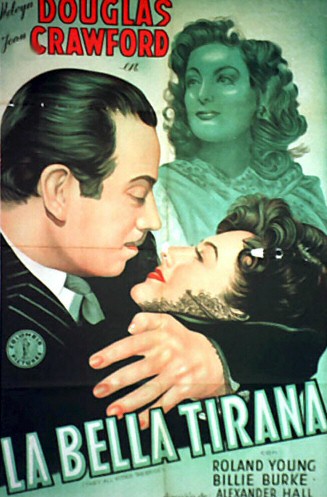
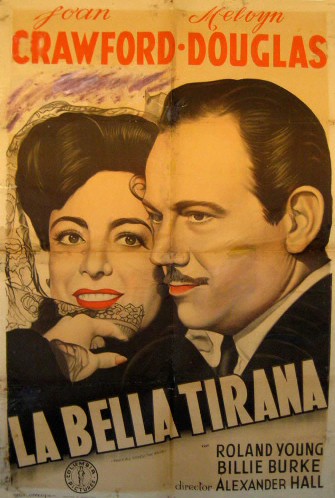
Above: Argentina one-sheets. Below: French posters.
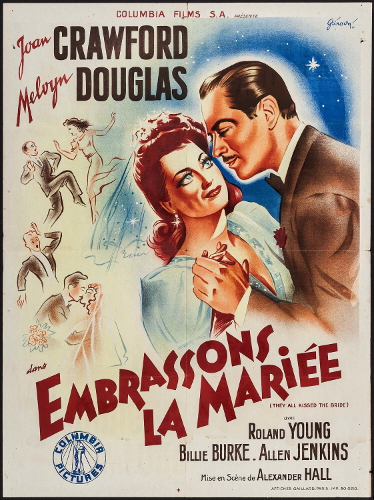
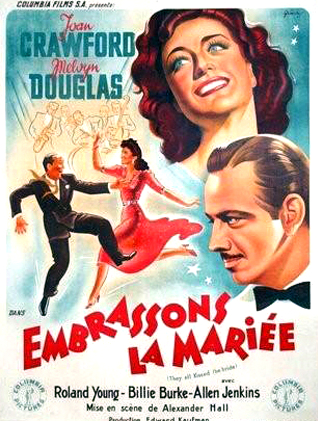
Below: Italy and Spain.

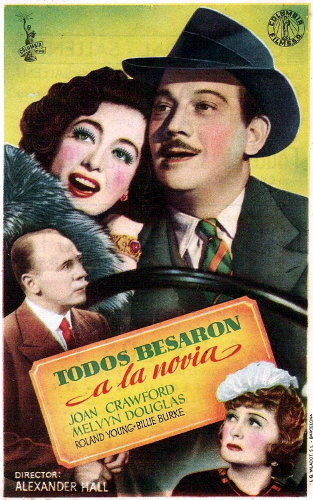
Below: US posters.
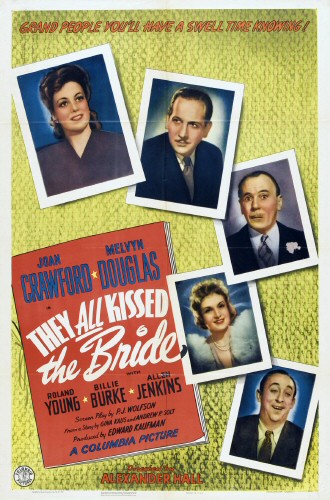
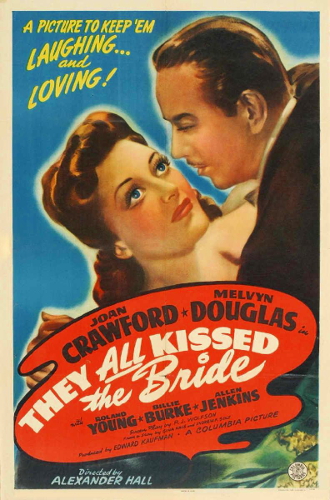
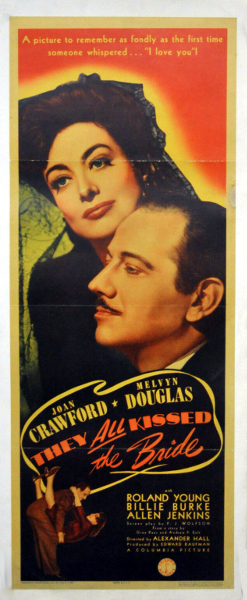
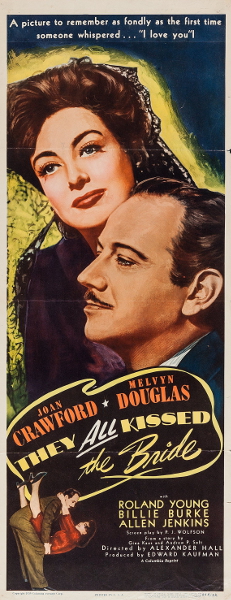
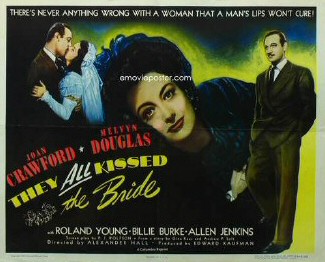
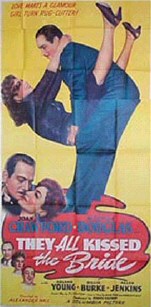

Above: US lobby cards
Below: Italian lobby cards



Above: US banner. 24 by 82 inches.
Below: Belgian window card (11 x 17.5 inches), and two US magazine ads.



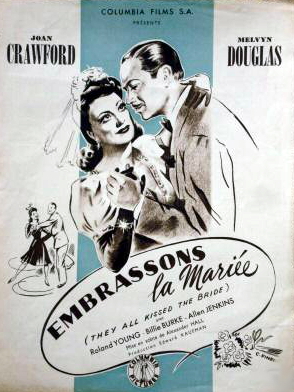

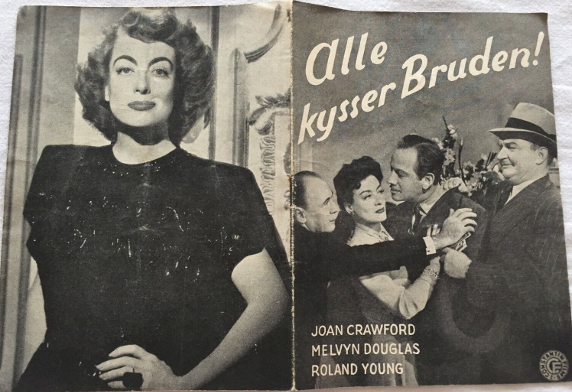
Above: French pressbook, UK pressbook, and Danish program.
Below: US (Roxy Theatre, NYC) program cover and centerfold.


Below
left:
A
UK ad from Kine Weekly (Oct. 22, 1942). Below
right:
Columbia cartoon publicity.



The Best of Everything